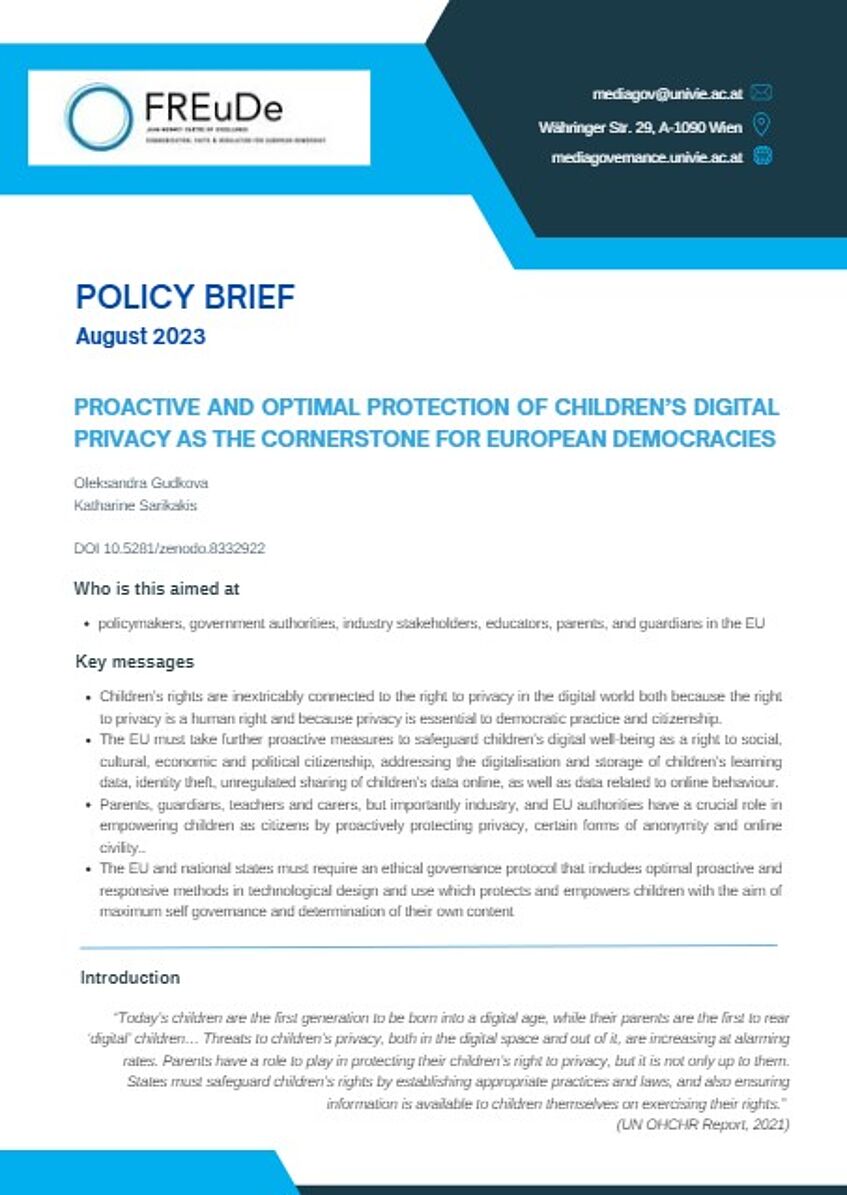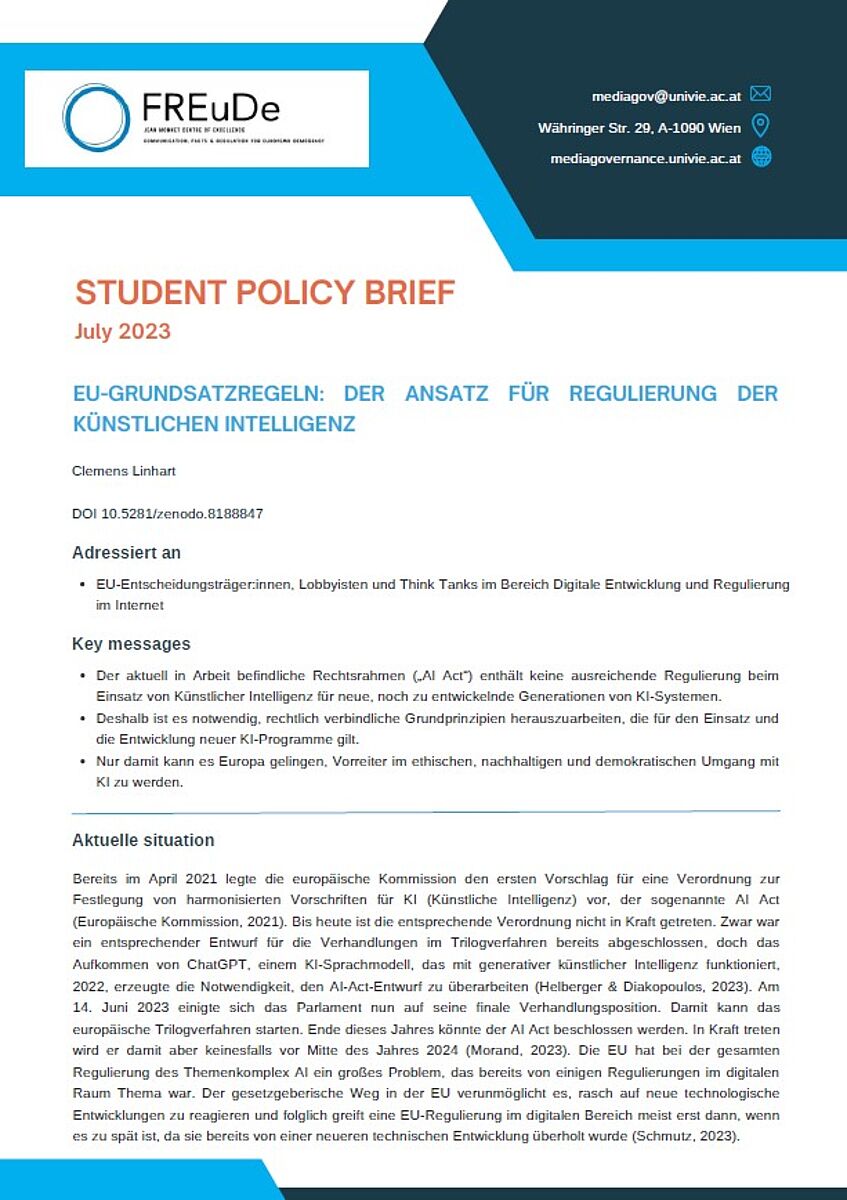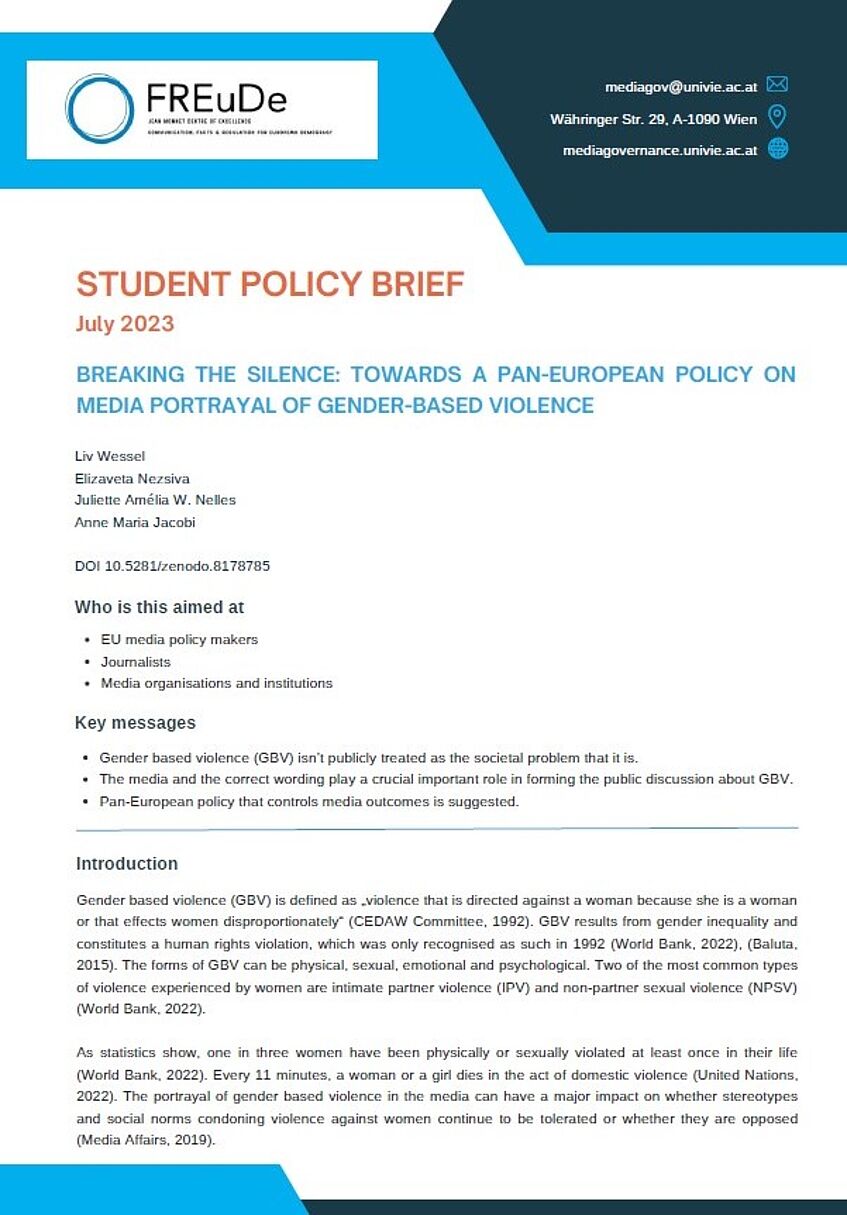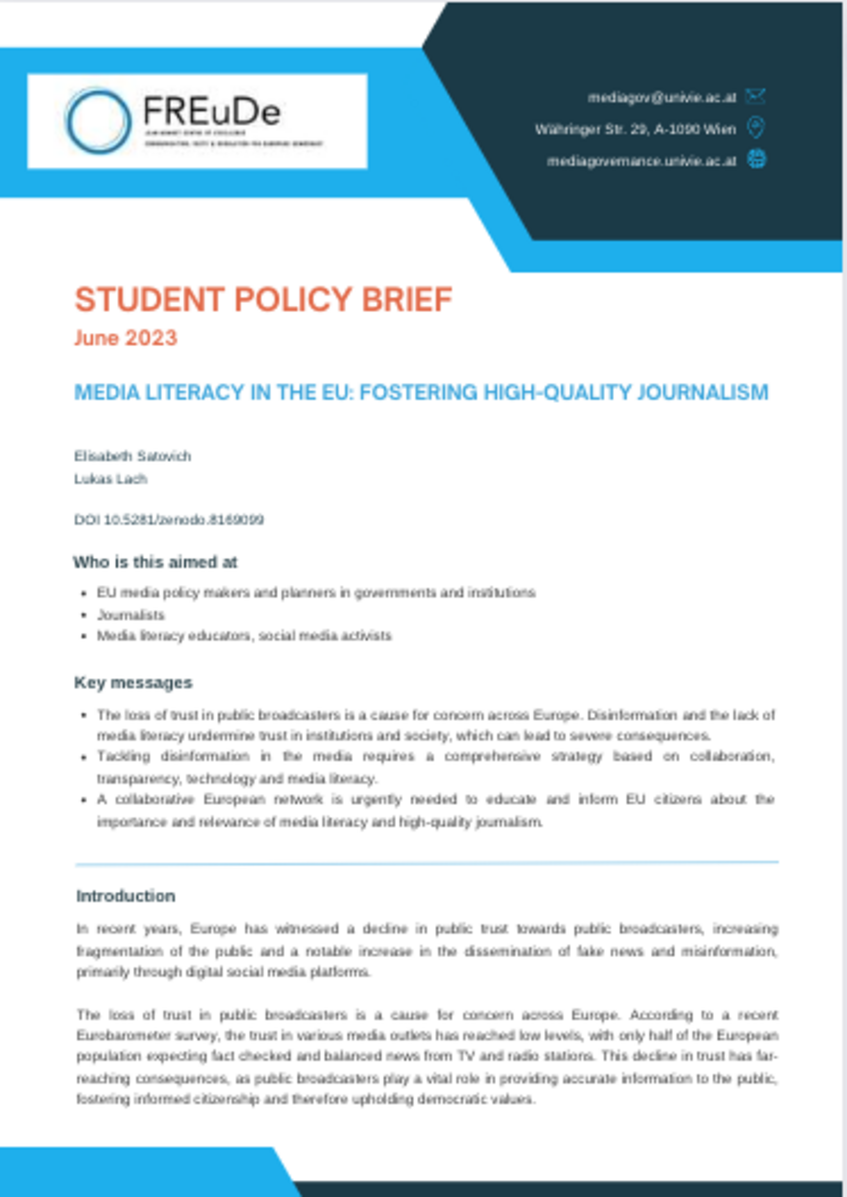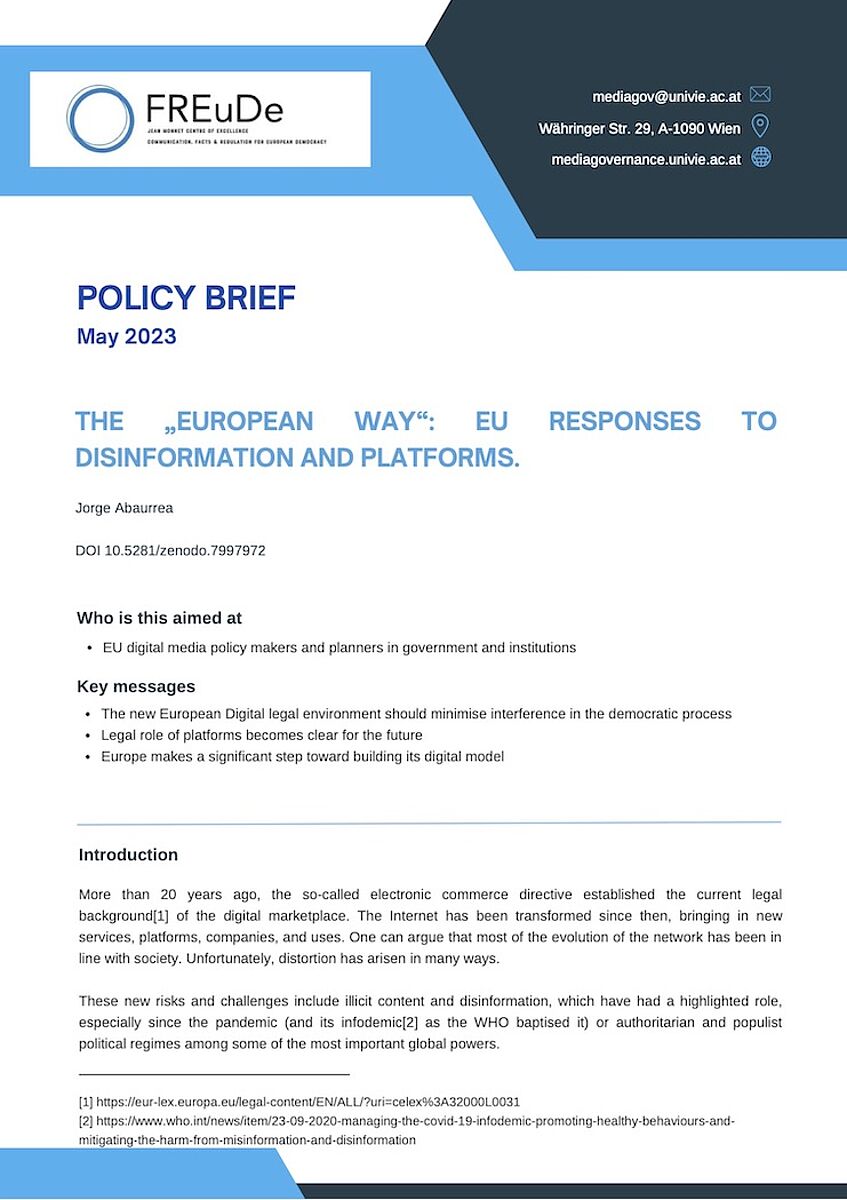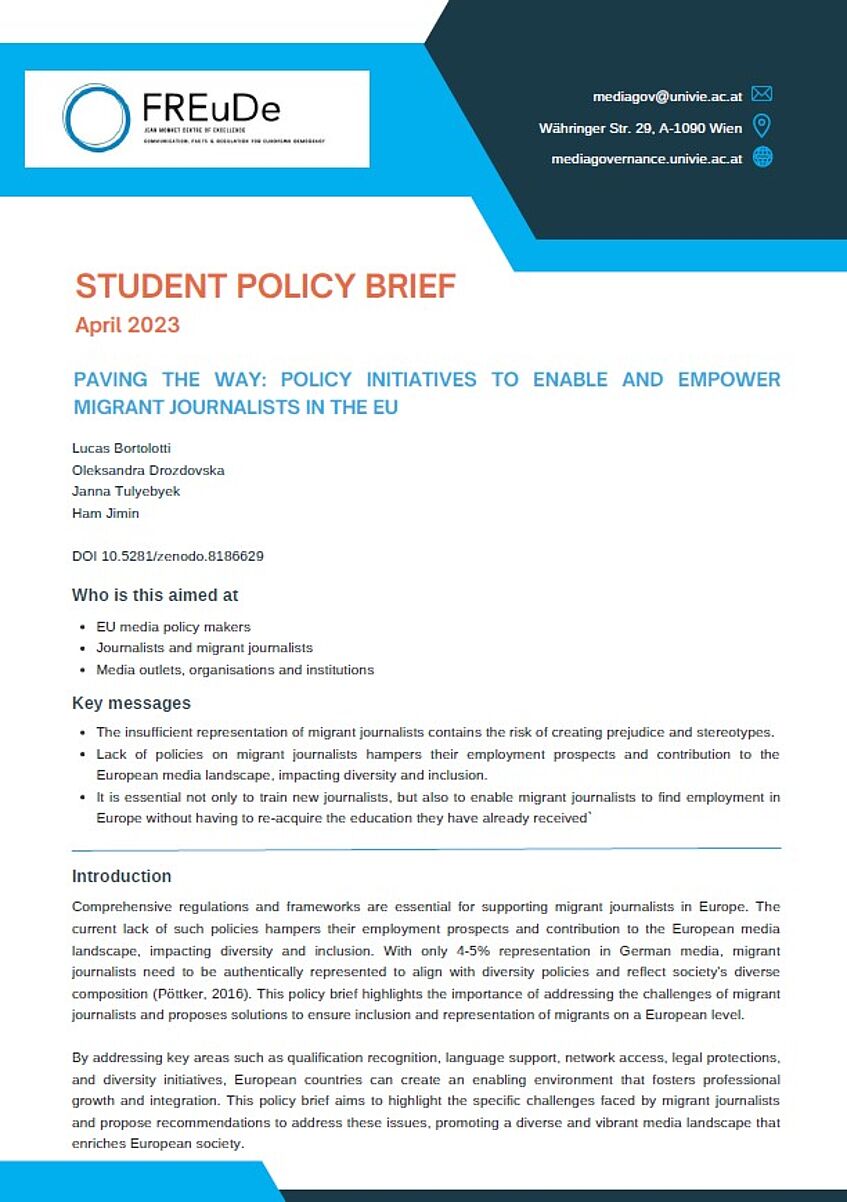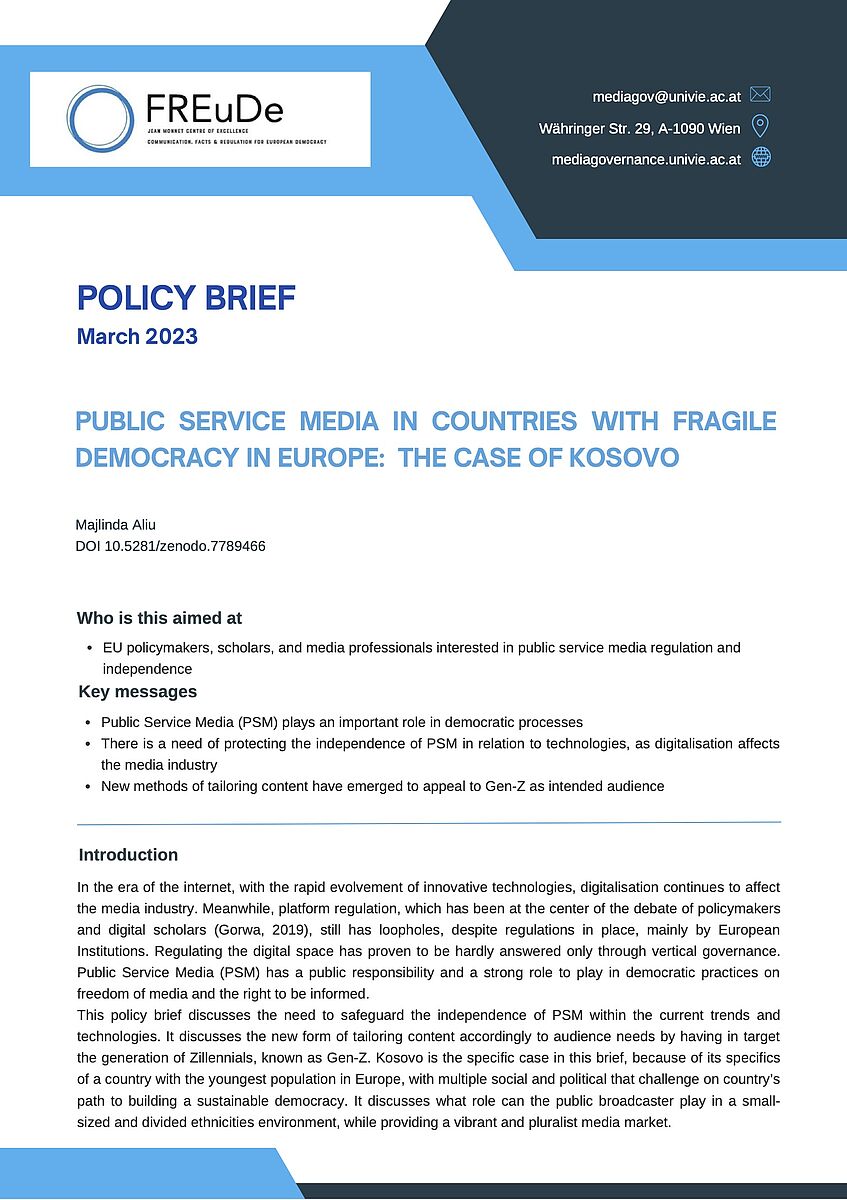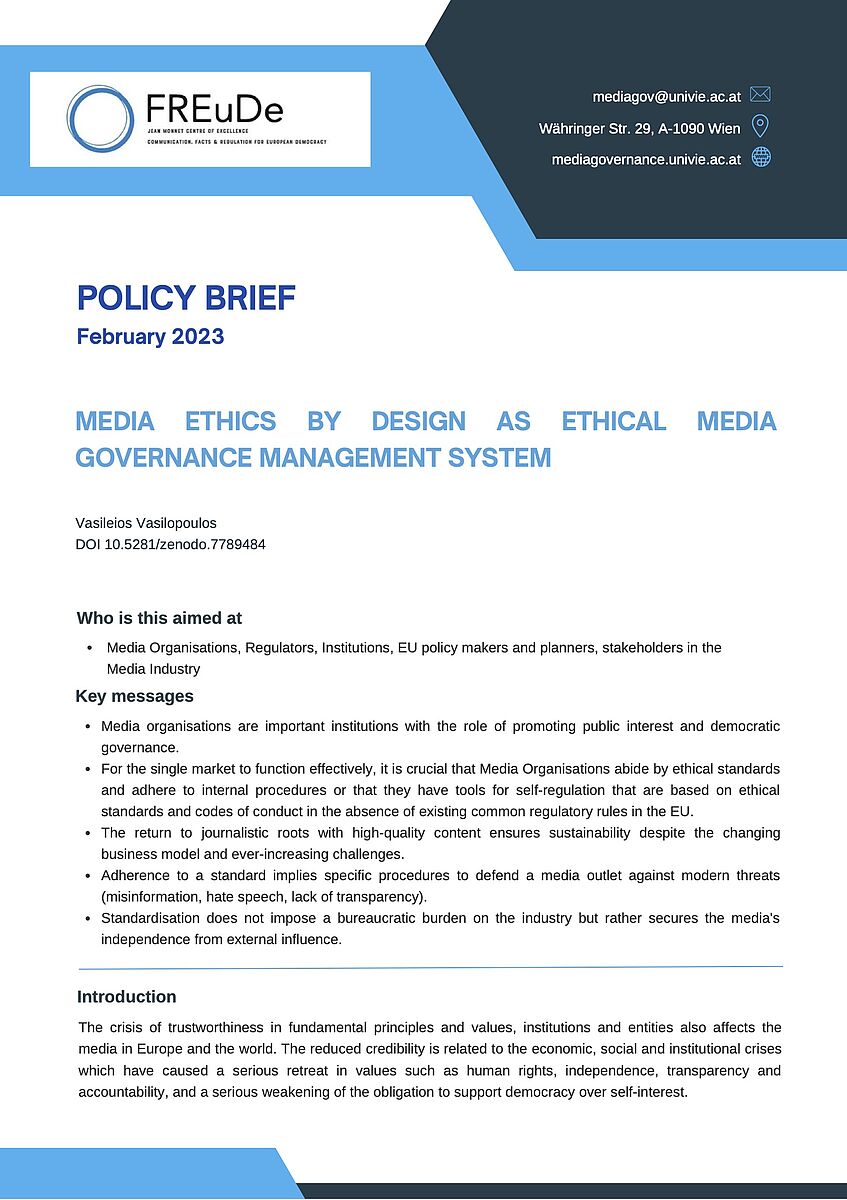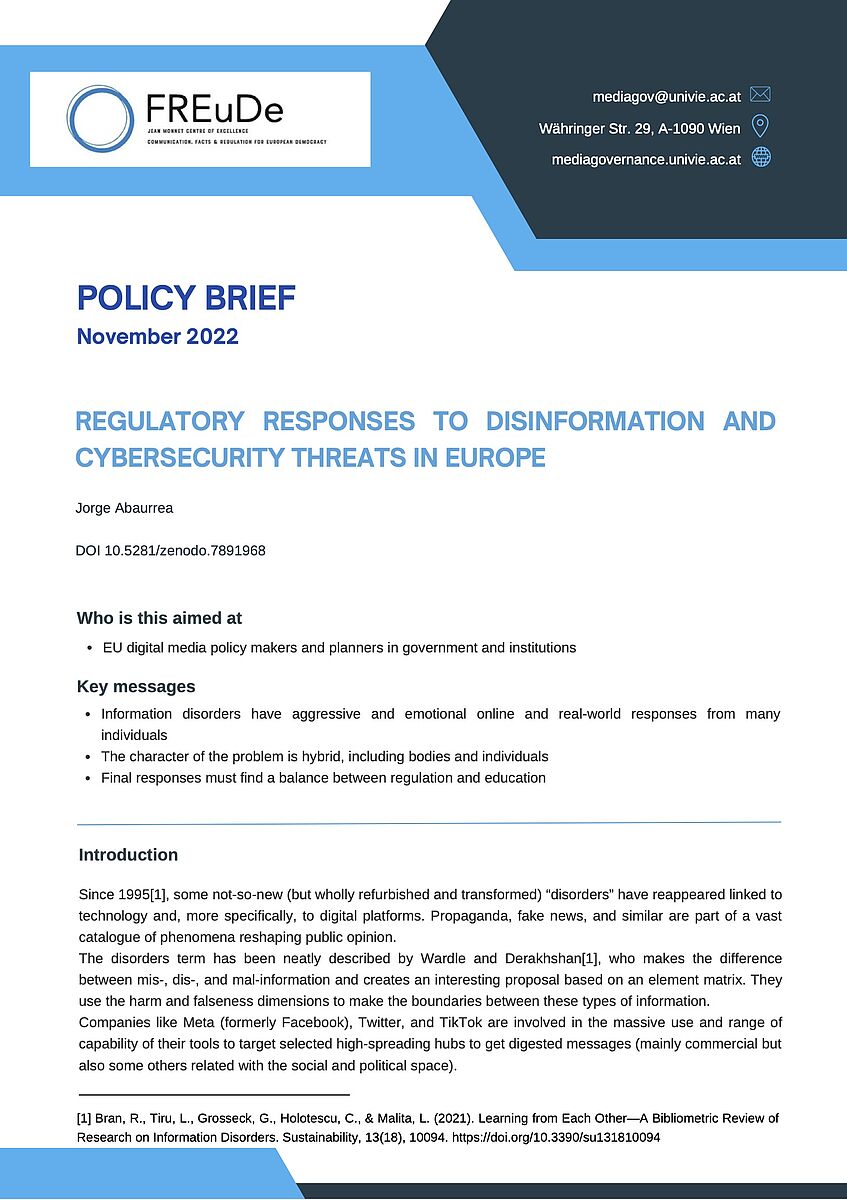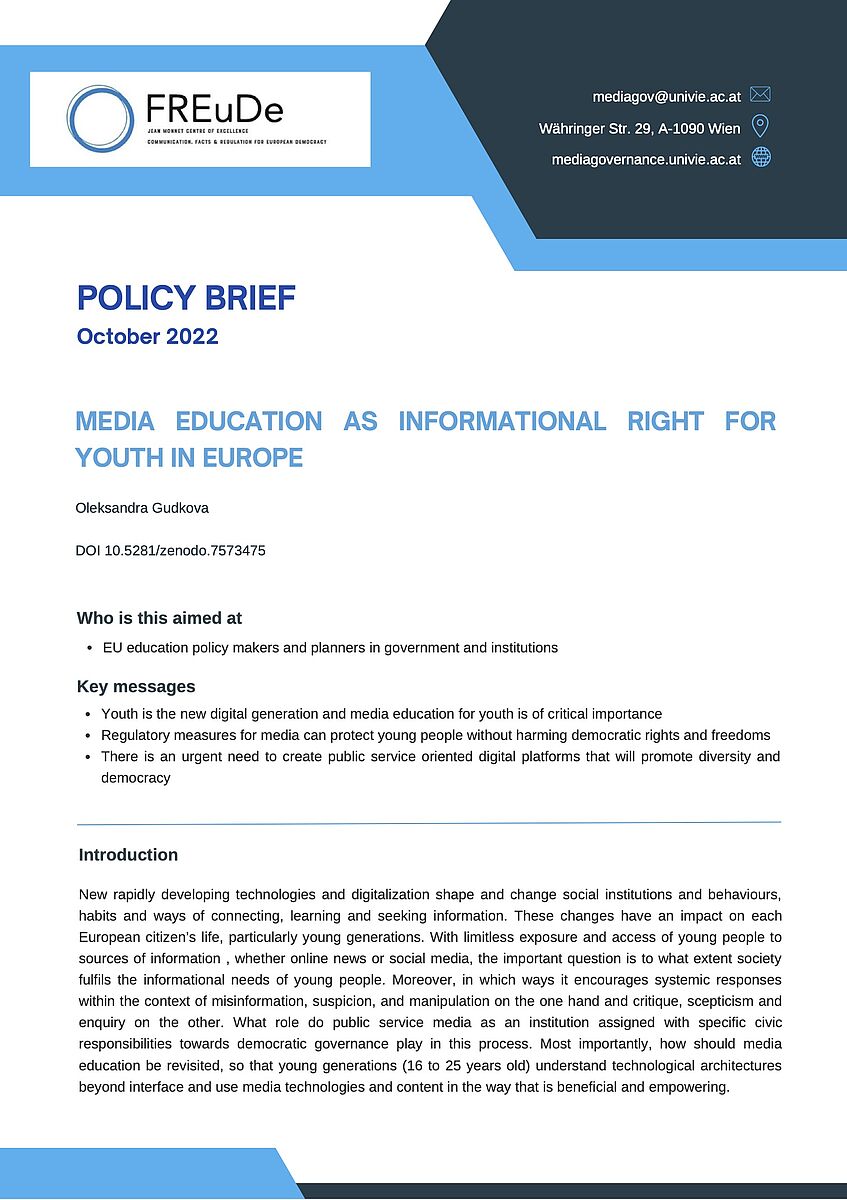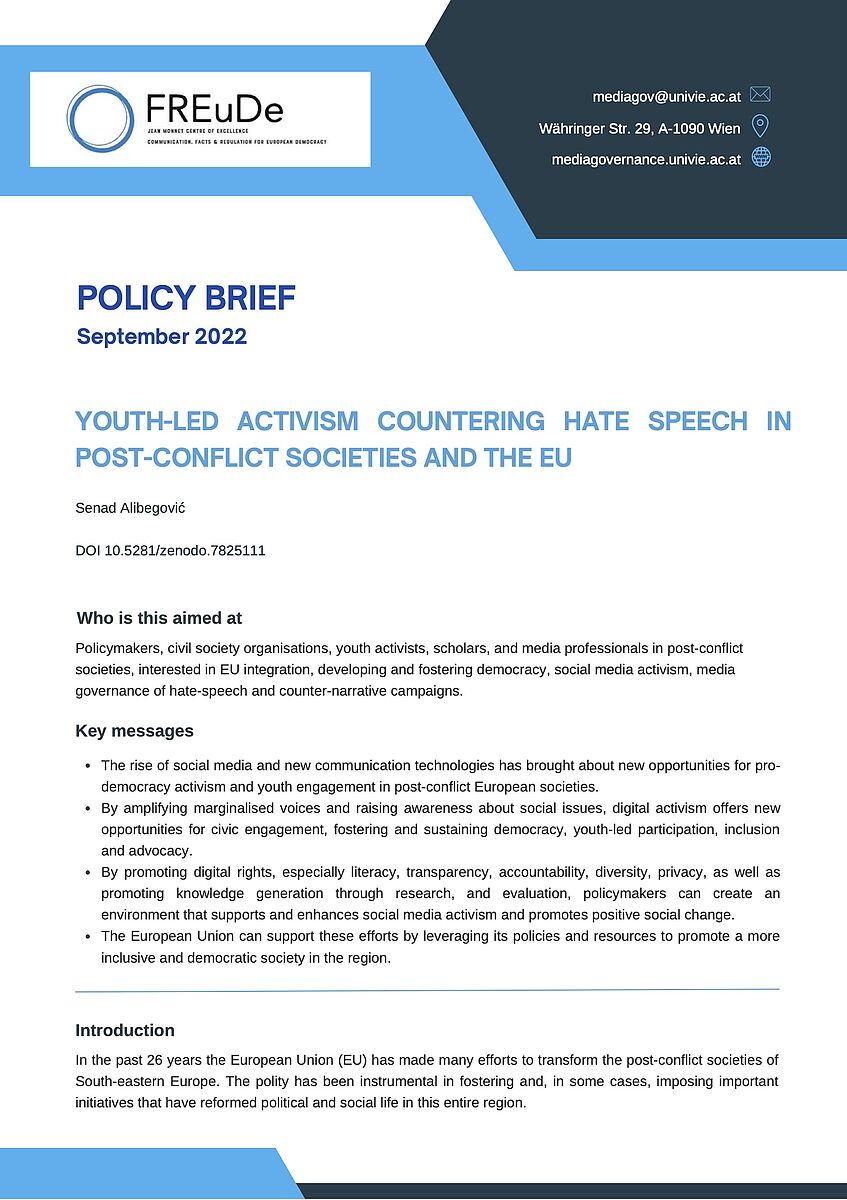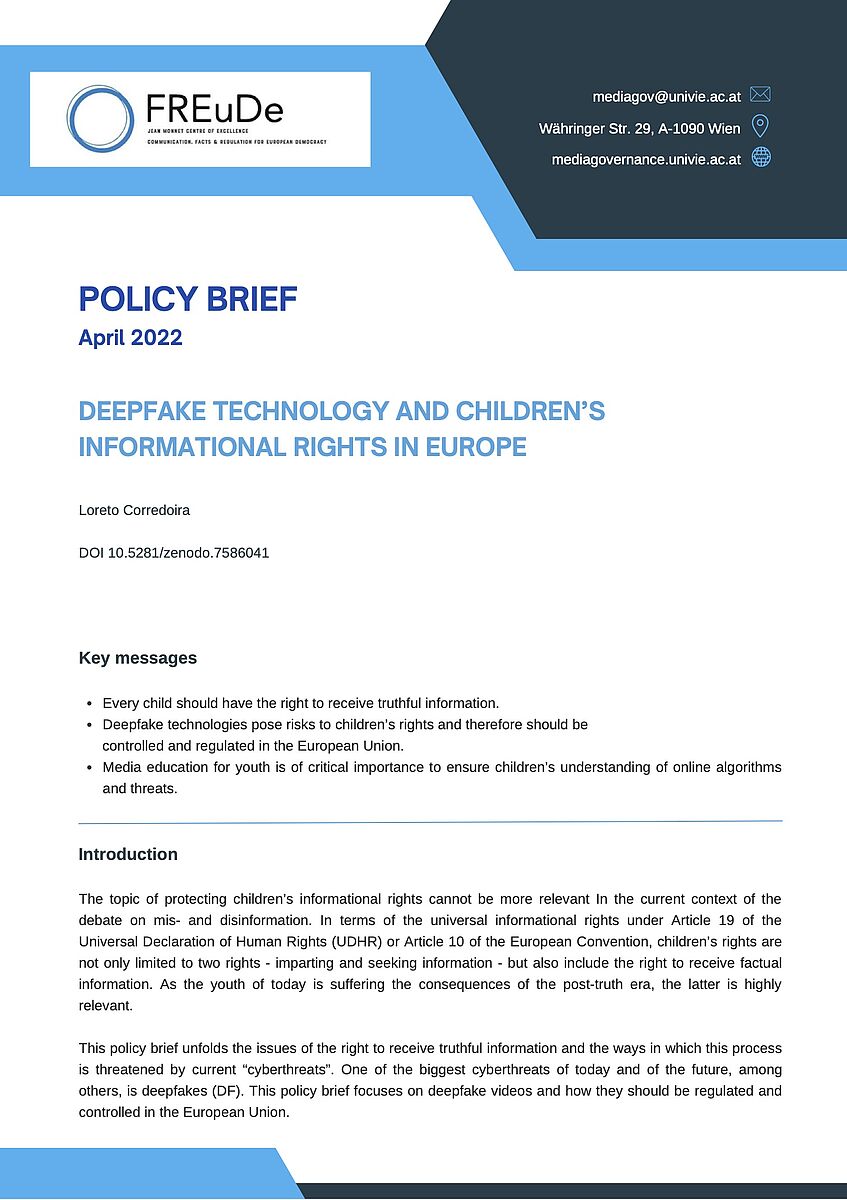Proactive and Optimal Protection of Children’s Digital Privacy as the Cornerstone for European Democracies
Policy Brief, August 2023
Internet users are subjected to a number of threats concerning their personal data and other information that is being collected when they spend time on social media platforms. The importance of privacy as a human right has been re-assessed in practice and policy over the past decade repeatedly, due to the pressures its exercising undergoes under the global system of media platforms and the intrusive strategies of states. Not only is privacy as a right increasingly determined by global media platforms, but also even state authorities when not violating this right, operationalise its protection by limiting its scope. Children have a special mention in EU law as they can be considered particularly vulnerable and in need of additional measures of protection. This policy brief emphasises the significance of ensuring children's rights to digital privacy and identity protection in the European Union, providing practical recommendations to create a secure online environment for young individuals.
EU-Grundsatzregeln: der Ansatz für Regulierung der künstlichen Intelligenz
Student Policy Brief, July 2023
Der Policy Brief diskutiert die Problematik der geplanten EU-Verordnung zu Regulierung von künstlicher Intelligenz (AI Act). Diese Verordnung läuft Gefahr laufend von technischen Neuerungen überholt zu werden, da der Gesetzgebungsprozess auf EU-Ebene durchaus zeitintensiv ist. Dadurch könnte eine Rechtslücke entstehen und unregulierte KI in Europa zum Einsatz kommen. Das birgt etliche Risiken, die im Policy Brief näher erläutert werden. Abschließend wird ein Lösungsansatz präsentiert und im Zuge dessen die Forderung nach einer Grundsatz-Gesetzgebung betreffend künstlicher Intelligenz aufgestellt.
Breaking the Silence: Towards a Pan-European Policy on Media Portrayal of Gender-Based Violence
Student Policy Brief, July 2023
This policy brief discusses the current state of media portrayal of recognise gender-based violence as a structural and political problem, perpetuating harmful stereotypes and norms that enable violence against women. By implementing a pan-European policy that regulates media outcomes and promotes ethical reporting practices, the EU can take a crucial step towards combating gender-based violence and fostering a society that upholds the rights and dignity of all individuals. Emphasising the urgency and significance of this issue, this policy brief urges media organisations, journalists, and EU policymakers to work collaboratively in breaking the silence and initiating concrete measures towards a safer and more equitable future for all within the European Union.
Media Literacy in the EU: Fostering High-Quality Journalism
Student Policy Brief, June 2023
This policy brief discusses challenges posed by disinformation and the decline in public trust towards media. Fostering high-quality journalism through media literacy initiatives becomes imperative. Europe's public broadcasters, which have long played a crucial role in delivering accurate information and fostering informed citizenship, face unprecedented challenges in an era of digital social media platforms and information fragmentation. Media literacy serves as a powerful tool to combat disinformation, enabling individuals to critically evaluate information and make truthful decisions.
The „European way“: EU Responses to Disinformation and Platforms
Policy Brief, May 2023
This policy brief discusses illicit content and disinformation arising from the evolution of the network and its distortions. To handle this new panorama, the European Parliament's update on policies of disinformation has had an essential role in this legislature. It has been carried out through the Digital Services Act package which includes the Digital Services Act (DSA) and the Digital Markets Act (DMA). Indeed, more than 20 years ago, the so-called electronic commerce directive established the current legal background of the digital marketplace.
Paving the Way: Policy Initiatives to Enable and Empower Migrant Journalists in the EU
Student Policy Brief, April 2023
This policy brief discusses regulations and frameworks for supporting migrant journalists in Europe. The current lack of such policies hampers their employment prospects and contribution to the European media landscape, impacting diversity and inclusion. This policy brief highlights the importance of addressing the challenges of migrant journalists and proposes solutions to ensure inclusion and representation of migrants on a European level.
By addressing key areas such as qualification recognition, language support, network access, legal protections, and diversity initiatives, European countries can create an enabling environment that fosters professional growth and integration. This policy brief aims to highlight the specific challenges faced by migrant journalists and propose recommendations to address these issues, promoting a diverse and vibrant media landscape that enriches European society.
Public Service Media in Countries with Fragile Democracy in Europe: the Case of Kosovo
Policy Brief, March 2023
This policy brief discusses the need to protect the independence of Public Service Media within the current trends and technologies. It discusses the new form of tailoring content accordingly to audience needs by having in target the generation of Zillennials, known as Gen-Z. Kosovo is the case considered in this brief, because of its specifics of a country with the youngest population in Europe, with multiple social and political that challenge on country’s path to building a sustainable democracy. It discusses what role can the public broadcaster play in a small- sized and divided ethnicities environment, while providing a vibrant and pluralist media market.
Media Ethics by Design as Ethical Media Governance Management System
Policy Brief, February 2023
This policy brief discusses the crisis of trustworthiness in fundamental principles and values, institutions and entities that also affects the media in Europe and the world. The reduced credibility is related to the economic, social and institutional crises which have caused a serious retreat in values such as human rights, independence, transparency and accountability, and a serious weakening of the obligation to support democracy over self-interest.
In this scenario media look for new and alternative economic models. In this transformation process, the key question is whether standardised processes, which introduce self-regulatory initiatives in the SME industry into the ecosystem, can play a decisive role. Can they really guarantee an improvement in their functioning, healthy competition, business success, public interest and public expectations? In the media, the fundamental standard is the Code of Conduct. Ethics should therefore govern any standardised governance system, both in its design and implementation.
Regulatory Responses to Disinformation and Cybersecurity Threats in Europe
Policy Brief, November 2022
This policy brief covers the topic of cybersecurity, reffering primarly to “disorders” which have reappeared linked to technology and, more specifically, to digital platforms, like propaganda, fake news, and similar. These are part of a catalogue of phenomena reshaping public opinion. The relevance of the topic appears clear when considering that social media are the primary medium of choice for reading news for young people (aged 16-29 years).
Media Education as Informational Right for Youth in Europe
Policy Brief, October 2022
This policy brief focuses on investigating the extents to which society fulfils the informational needs of young people and in which ways it faces the challenges of misinformation, suspicion, and manipulation on the one hand and critique, scepticism, and enquiry on the other. In this the role played by public service media is considered as invested of specific civic responsibilities towards democratic governance play in this process. Also, the importance of media education to young generations (16 to 25 years old) is highlighted.
The questions are important to tackle when considering the new rapidly developing technologies and digitalization which shape and change social institutions and behaviours, habits, and ways of connecting, learning, and seeking information. These changes have an impact on each European citizen’s life, particularly young generations.
Youth-led Activism Countering Hate Speech in Post-conflict Societies and the EU
Policy Brief, September 2022
This policy brief focuses on the new opportunities for prodemocracy activism and youth engagement in post-conflict European societies, created by the rise of social media and new communication technologies. The phenomenon amplifies marginalised voices and raise awareness about social issues, fostering and sustaining democracy, youth-led participation, inclusion and advocacy.
By promoting digital rights, especially literacy, transparency, accountability, diversity, privacy, as well as promoting knowledge generation through research, and evaluation, policymakers can create an environment that supports and enhances social media activism and promotes positive social change. The European Union can support these efforts by leveraging its policies and resources to promote a more inclusive and democratic society in the region.
Deepfake Technology and Children's Informational Rights in Europe
Policy Brief, April 2022
This policy briefs focuses on children informational rights, specifically related to the right to receiving truthful information, and the “cyberthreats” posed to this process, such as deepfakes (DF). Specifically, it focuses on deepfake videos and how they should be regulated and controlled within the European Union.
When considering the ongoing debate surrounding mis- and disinformation, the safeguard of children’s informational right appear to be of extreme relevance and considering the youth as suffering the consequences of the post-truth era, the right to receive factual information and its protection is highly important.

